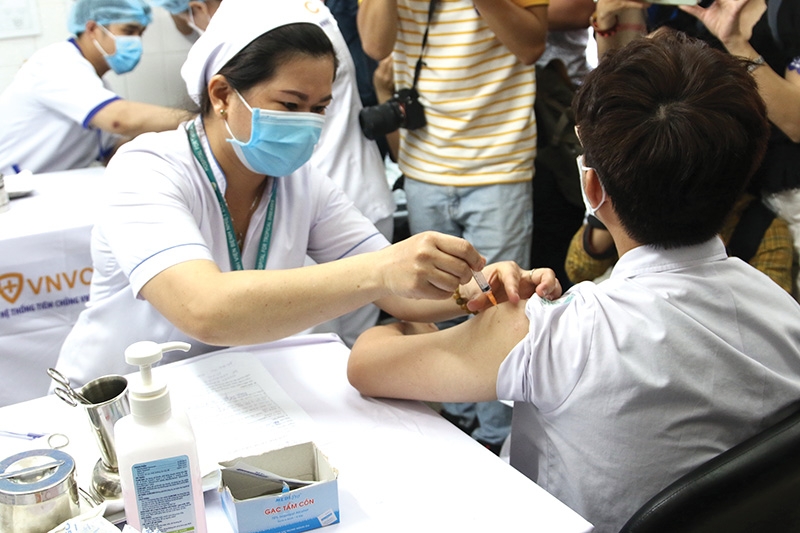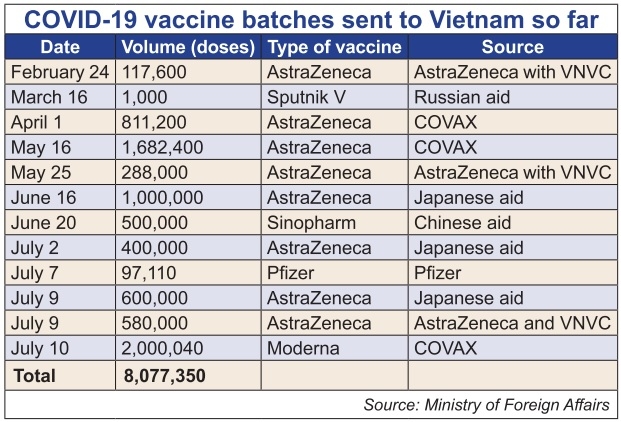Diplomacy switches up a gear for wider vaccine coverage
 |
| Vietnam has secured commitments to receive 105 million vaccine doses. Photo: Le Toan |
Last week, State President Nguyen Xuan Phuc held a phone call with Romanian President Klaus Werner Iohannis, reaffirming both nations’ ever-increasing cooperation across many areas, with a highlight in sharing experiences in fighting the current pandemic. Praising Vietnam’s efforts and achievements in fighting COVID-19, President Iohannis said his government will give Vietnam 100,000 doses of the AstraZeneca COVID-19 vaccine, and will consider giving more in the future.
Earlier on July 10, Prime Minister Pham Minh Chinh also had a phone call with his Indian counterpart Narendra Modi. Both leaders said that the two countries will further tighten cooperation, with mutual support in pushing back the pandemic. PM Chinh suggested that the Indian government prioritise to assist Vietnam in access to vaccines in different forms as fast as possible, and also cooperate in transferring vaccine-producing technologies to Vietnam, while also facilitating agencies of both nations in supplying Indian vaccines. PM Modi said India stands ready to rivet cooperation with Vietnam in this area.
Great efforts
The Ministry of Foreign Affairs (MoFA) last week reported that in the first six months of this year, it contributed to organising 35 telephone talks by Vietnam’s leaders with their counterparts of the country’s partner nations, a similar outcome to the 34 talks held last year.
The MoFA has been actively implementing vaccine diplomacy activities, with positive contributions to the country’s efforts in carrying out the tasks of pandemic fighting and economic development, as well as Vietnam’s achievements in combating COVID-19, the MoFA said.
MoFA Deputy Minister Nguyen Minh Vu said that the pandemic fight in Vietnam remains extremely complicated, especially with this latest and biggest outbreak. The virus also has many sources with multiple strains - including the Delta variant which is more dangerous and much more prevalent in many nations now.
“Inoculation is a very important part of the solution to this rampant pandemic. Since COVID-19 appeared, the Politburo, the Party Secretariat, and the government have prepared for and comprehensively directed pandemic prevention and control activities, including the deployment of a vaccine strategy,” Vu said.
This strategy includes three key points. First is to find vaccine sources from outside of Vietnam; second is beefing up international cooperation in technological transfer for vaccine production; and lastly is to produce homemade vaccines in order to ensure safe and effective inoculation of people.
“In this strategy, vaccine diplomacy is of great importance which is an imperative and long-term solution. We must shore up sources of vaccines while having to create favourable conditions for economic recovery, with production and business activities bouncing back,” Vu said.
This vaccine strategy has been deployed methodically at various levels. The Party general secretary, state president, chairman of the National Assembly, the government, and the prime minister have paid great heed to and directly partaken in this course of action, which includes both bilateral and multilateral diplomacy and formal/informal activities via telephone or post to world leaders, requesting access to vaccine resources.
PM Chinh has directed the MoFA, the Ministry of Health (MoH), and other relevant ministries and agencies, together with over 90 overseas Vietnamese representative agencies, to participate in the country’s vaccine diplomatic activities.
“In hundreds of phone calls and contacts at home and abroad, there is no single foreign meeting of the country’s top leaders that fails to mention cooperation on vaccine purchase, production, and distribution,” Vu said.
On July 10, Vietnam launched its historic nationwide COVID-19 inoculation programme for all people above 18. The programme will last until April 2022, aiming to hit a goal of vaccinating 75 million people.
 |
Outcomes
Under Resolution No.21/NQ-CP dated February 26 on purchase and use of vaccines against COVID-19, Vietnam set a target of securing 150 million vaccine doses for inoculating 70 per cent of its population. Under the direction of the Politburo, the Party Secretariat, and the prime minister, along with efforts in negotiations of the MoH in combination with the MoFA, Vietnam has landed commitments and signed contracts for about 105 million doses thus far.
This includes nearly 39 million doses granted by COVID-19 Vaccines Global Access (known as COVAX), 30 million doses from a contract between AstraZeneca and Vietnam Vaccine JSC (VNVC), 31 million doses from a contract between Pfizer and the government, and five million doses of Moderna that authorised Zuellig Pharma Vietnam to provide.
Vietnam is now also negotiating to buy another 55 million doses including 40 million doses of Sputnik-V from Russia and 15 million doses of Covaxin.
“We have actively mobilised government and vaccine producers to sell vaccines to Vietnam and provide the products early for the country. This mobilisation is of big significance given global shortages of vaccines,” said an MoFA document on vaccine diplomacy. “With active mobilisation and negotiations, over the past month and more, we have received a growing volume of vaccines.”
As of July 12, Vietnam has received eight million vaccine doses, and the number will continue increasing in the next few weeks with negotiated sources from nations and producers agreeing to provide the products early for Vietnam, in addition to other vaccine sources from bilateral partner nations and international organisations.
According to the MoFA, Vietnam’s vaccine diplomacy activities have reaped some specific outcomes. COVAX will officially provide Vietnam with an additional million doses of Pfizer-BioNTech by September this year after supplying 4.5 million doses to the country so far. COVAX also provided Vietnam on July 10 with two million doses of Moderna sourced from the United States via COVAX, while also supporting the transfer of technology to produce mRNA vaccines.
COVAX will also send experts to Vietnam to assist and make vaccines under international standards and stands ready to support Vietnam in developing into one of the vaccine production hubs in the region. Meanwhile, the US government has provided Vietnam with two million Moderna vaccine doses via COVAX.
Japan has also provided Vietnam with three million AstraZeneca doses while stating that the nation stands ready to cooperate with Vietnamese enterprises in both vaccine testing and technological transfer.
The United Kingdom has also vowed to list Vietnam as one of the nations to be prioritised by the British programme on allocating 100 million doses to nations via COVAX and bilateral mechanisms. The UK is willing to work with AstraZeneca on tech transfer and support Vietnam in building up capacity in production.
Australia has also promised to aid Vietnam with A$13.5 million ($10 million) to purchase vaccines via UNICEF. Last week, the Australian Embassy to Vietnam announced that it will support Vietnam’s national vaccine rollout by providing 1.5 million AstraZeneca COVID-19 vaccine doses in 2021 as part of its commitment to assist close friends and partners in the region.
“These doses will complement Australia’s existing $40 million package through which we are working in partnership with Vietnam on its vaccine rollout,” said a release from the embassy. “Our assistance includes funding for additional doses to be procured through Australia’s agreement with UNICEF, vaccine delivery support, and technical advice.”
UNICEF will also support Vietnam in a COVID-19 inoculation project during 2021-2023, in which Vietnam will be provided with over 1,900 high-capacity storage refrigerators. The fund will also help Vietnam mobilise $10 million to deploy this project, in which Japan will provide $2 million and Australia $8 million.
South Korea, meanwhile, is supporting Vietnam with 30 million cylinders worth $2.5 million, and the authorities and other groups from some German states have presented Vietnam with a million rapid test kits.
According to the MoFA, at the high-level discussion sessions of the United Nations Security Council, the Asia Future Conference, the Partnership Summit for Green Growth, and the Global Goals 2030, President Phuc and PM Chinh underlined the importance of the international community to solve vaccine shortages together, ensuring equitable distribution of vaccines to developing and underdeveloped nations. Vietnam has also contributed $500,000 to the global vaccine fund.
What the stars mean:
★ Poor ★ ★ Promising ★★★ Good ★★★★ Very good ★★★★★ Exceptional
 Tag:
Tag:
Themes: Healthcare Platform
- PM outlines new tasks for healthcare sector
- Opella and Long Chau join forces to enhance digestive and bone health
- Hanoi intensifies airport monitoring amid Nipah disease risks
- Cosmetics rules set for overhaul under draft decree
- Policy obstacles being addressed in drug licensing and renewal
Related Contents
Latest News
More News
- Spring Fair 2026 boosts domestic demand (March 02, 2026 | 16:30)
- Law on Investment takes effect (March 02, 2026 | 16:21)
- Ho Chi Minh City attracts nearly $980 million in FDI in early 2026 (March 02, 2026 | 10:57)
- Businesses bouncing back after turbulent year (February 27, 2026 | 16:42)
- VinaCapital launches Vietnam's first two strategic-beta ETFs (February 26, 2026 | 09:00)
- PM sets five key tasks to accelerate sci-tech development (February 26, 2026 | 08:00)
- PM outlines new tasks for healthcare sector (February 25, 2026 | 16:00)
- Citi report finds global trade transformed by tariffs and AI (February 25, 2026 | 10:49)
- Vietnam sets ambitious dairy growth targets (February 24, 2026 | 18:00)
- Vietnam, New Zealand seek level-up in ties (February 19, 2026 | 18:06)





















 Mobile Version
Mobile Version